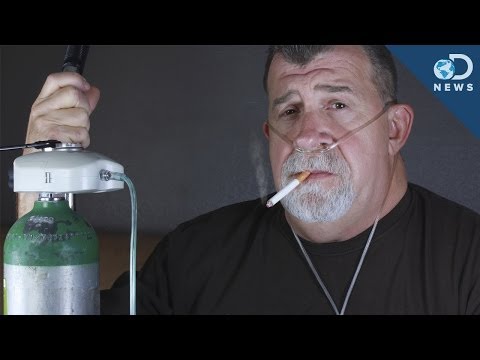Hey guys, Tara here for Dnews – and if you’re a smoker who’s been trying to quit, then boy do we have good news for you! I mean, relatively. Anyone who’s participated in DARE, or read a scientific article, or been alive on planet earth for more than a second, knows that cigarettes are bad for you. On average, smokers die 14 years before non-smokers, and half of the smokers who don’t quit, are eventually killed by their habit. So clearly, they’re terrible. But, you may be wondering, what happens after I DO quit? Can the effects of smoking be reversed, and how long would it take for that to happen? Before we answer that, let’s examine the 2 major ways that cigarettes affect your lungs.
The first thing they do, is destroy cilia, which are tiny little hairs that live in the mucus lining of your lungs. When you inhale pathogens or dirt, they get trapped in that mucus, and the cilia is what pushes them back out. When you smoke cigarettes, the poisons in them paralyze and destroy those cilia, making it harder for you to avoid infections. BUT, within just a few days of quitting cigarettes, those cilia will start to regenerate. And they’ll continue to get better – until eventually, your lungs return to their original functioning capacity. So that part – you absolutely can reverse.
Studies have shown that people who quit smoking – and stay that way – reduce their risk of lung cancer to that of a person who has never smoked, within 10-15 years. However – there is caveat. Cigarettes can permanently damage your lungs’ alveoli, which are the tiny little air sacs that absorb oxygen into your bloodstream, and release carbon dioxide. People who have been smoking heavily, or for a very long time, are at much greater risk for developing chronic obstructive pulmonary disease. That includes chronic bronchitis, which is a potentially reversible inflammation of the airways, and emphysema – which destroys your alveoli, making it difficult for your lungs to absorb the oxygen they need. Unlike cilia, alveoli cannot regrow themselves, so emphysema is a permanent – and devastating – disease. Even so, the effects of quitting smoking – begin the day you stop. Within a month, you’ll feel like you can breath significantly better than before – and within a year, your risk of having a heart attack is reduced by 50%. According to the American Cancer Society, smokers who quit before age 35 prevent 90% of the risk of health problems from smoking.
And a smoker who quits before age 50 halves their risk of dying within the next 15 years. Norman Edelman is the chief medical officer of the American Lung Association, and he says that a smoker’s risk for developing smoking-related diseases, is directly correlated to the total number of cigarettes they’ve smoked in their lifetime. The metric they use, is called “pack years” – and it’s the average number of packs a person smokes, per day – multiplied by the number of years they’ve been smoking. The greater your pack-years, the greater your risk. And according to Edelman, people who have 50 pack-years or more under their belt, even if they quit – will never completely reduce their risk of lung cancer back to that of a non-smoker. Of course, genetics also play a huge role in how cigarettes affect you. Up until a few months ago, my dad smoked 2 packs a day for 55 years – and never once experienced any adverse breathings effects.
But on the flip side, there are people in their 20s, who smoked for 2 years and died of emphysema. So it really is different for everybody. Also, dad – I’m really proud of you for quitting. Enough about me though, what do you guys think? Are you a smoker who’s been trying to quit? Or are you not convinced that the effects can be reversed? Let us know your thoughts in the comments below, and as always – thank you guys for watching..
